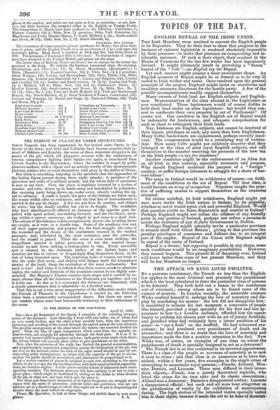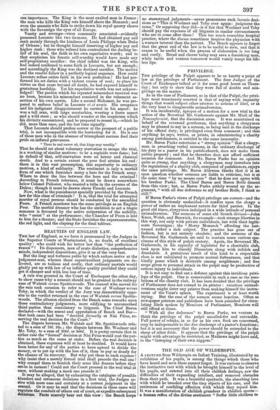THE ATTACK ON KING LOUIS PHILIPPE.
BY a perverse consistency, the French no less than the English law applies to the most criminal acts precisely that punishment which is the least calculated to deter the particular class of persons to be deterred. They both hold out a bonus to the murderous sort of criminals ; among whom are to be found some of the vainest of mortals. In London recently, the miserable creature Wicks enabled himself to indulge the love of notoriety and dis- play by murdering his master: the law did not disappoint him: it assembled to witness his last moments a concourse of people like himself, provided a stage specially for his first and last ap- pearance to bow to a London audience, afforded him the oppor- tunity to perform his chosen part with an air of jaunty fortitude, and gratified what had evidently been a latent ambition of his mind—to "cut a flash" on the scaffold. He had witnessed ete- cutions; he had pondered over punishment of death and its accessories ; and there is no doubt that the love of notoriety and importance made the fate a positive attraction to the fool. lsl.ow Wicks was, of course, an exemplar of one class on whom the punishment of death is specially designed to act as a deterrent! The French law is no less consistent in its inverted appositeness. There is a class of the people so covetous of notoriety as to seek it even in crime ; and that class is so numerous as to have fur- nished, within a few years, five examples in the single crime of attempting to assassinate royal persons,—Fieschi, Alibaud, Meu- nier, Darmes, and Lecomt,e. These men differed in their imme- diate objects,—Fiescln was a purely theoretical regicide, who loved the crime for its own sake and its classic associations; Alibaud was a democrat; Darmes a disappointed soldier; Lecomt a disappointed official : but each and all were bent altogether on the gratification of vanity by the exhibition of unscrupulous daring. The high station of the intended victim specially suited him to their object, because it made the act to be done of =monk.
ous importance. The King is the most exalted man in France : the man who kills the King sets himself above the Monarch ; and even the assassin who fails to strike down his royal quarry shares with the Sovereign the eyes of all Europe. Vanity and revenge—vices commonly associated—evidently possessed Lecomte like two dfemons. He had obtained pay and rank mainly through the kindness of Louis Philippe when 'Duke
• of Orleans; but he thought himself deserving of higher pay and higher rank : those who refused him contradicted the darling be- lief of his soul, the faith in his own superlative worth ; and to that scepticism his fanatic self-worship would have made any self-propitiatory sacrifice : the chief infidel was the King, who had indeed confessed to some faith in Lecomte, but not enough ; and accordingly the King was the destined sacrifice. The motive and the resolve follow in a perfectly logical sequence. How could Lecomte refuse entire faith in his own perfection? He had per- formed his set duties with a violent excess of zeal ; to place his virtue on that score beyond all doubt, he had exposed himself to gratuitous hardship. Yet his superlative worth was not acknow- ledged! The pardon which his repeated misconduct received was no boon, because his misconduct consisted in the vehement as- sertion of his own merits. Like a second Mahomet, he was pre- pared to enforce belief in Lecomte vi et armis. His arrogance and his indignant disappointment he carried in his aspect : he was a tall man, with large mustachios, wearing a fierce aspect and a wild stare ; as who should wonder at the scepticism which his divinity encountered, and be prepared to resent it,—which he • did, more than once, and the last time signally.
That Lecomte should profess sorrow at the prospect of a public trial, is not incompatible with the hankering for it. He is one of those men who in the absence of triumphant success feed their pride on inflated grievances.
"There he and sorrow sit, that kings may worship."
That he should set about voluntary starvation to escape the trial, is a working of similar motives : to be a regicide were fame ; but in default of that, self-starvation were an heroic and classical death. And to a certain extent the poor fool attains his end : there is in this vast presumption, this superiority to ordinary motives, a kind of sublimity. The sentiment is only a morbid form of one which furnishes many a hero for the French army. Where to draw the line between the hero and the criminal ? According to French tolerance, it must be drawn somewhere below Colonel Pelissier, who roasted a tribe in the caverns of the Dahra ; though it must be drawn above Fieschi and Lecomte-
Now, what is the punishment specially provided by the French law for this class of criminals ? It is, that the trial for attempted murder of royal persons should be conducted by the assembled Peers. A French murderer has the same privilege as an English Peer. The morbid dreamer who has the ambition to act a tragic romance is favoured by the active cooperation of the nobility, who " assist " at the performance ; the Chamber of Peers is lent to him for a theatre; and the State furnishes the supernumeraries, the red light, and the claptrap for the final tableau.



























 Previous page
Previous page